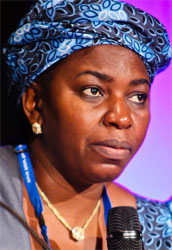The Federal Government has said it can only provide affordable but not free water for residents of the country.
This clarification, it said, was to clear misconceptions on the right of the citizens to water.
 The Minister of Water Resources, Mrs. Sarah Ochekpe, said this during a meeting with stakeholders on the effective implementation of the right to water in Abuja on Tuesday.
The Minister of Water Resources, Mrs. Sarah Ochekpe, said this during a meeting with stakeholders on the effective implementation of the right to water in Abuja on Tuesday.“I will make bold to clear misconceptions on human right to water. The right does not entitle people to free water, but affordable water and sanitation services,” she said.
Civil society groups and non-governmental organisations had faulted government’s inability to provide adequate portable water for residents, especially poor citizens living in slums.
Ochekpe, however, stated that the right to water and sanitation required that they were available, accessible, safe, acceptable and affordable for all without discrimination.
The minister maintained that the right to water and sanitation further required an explicit focus on the most disadvantaged and marginalised, as well as an emphasis on participation, empowerment, accountability and transparency.
She said, “The right also does not allow for unlimited use of water but sufficient water for personal and domestic uses in a sustainable manner.
“Finally, the right does not entitle everyone to household connection, but the water and sanitation facilities need to be within or in the immediate vicinity of the household.”
Ochekpe called on states and local governments to adopt the rights-based approach in formulating their water policies, laws and strategies, stressing that this would enhance the human right to safe drinking water and adequate sanitation.
In his reaction, the Programme Manager, Bread of Life Development Foundation, a civil society pressure group, Mr. Oluwasanmi Falobi, argued that there were about 70 million Nigerians who could not access portable water.
He said majority of people in this category were poor people who lived in slums.
According to him, if government cannot provide free water, it should at least make it accessible and very affordable to this category of citizens, not just for those in urban centres.
Ochekpe stated that a water resources bill that would address the various concerns in the sector would soon be out.
She said, “Our ministry is in the process of completing a National Water Resources Bill that will provide for equitable, beneficial, efficient and sustainable development, management, use and conservation of our surface and ground water resources.



















